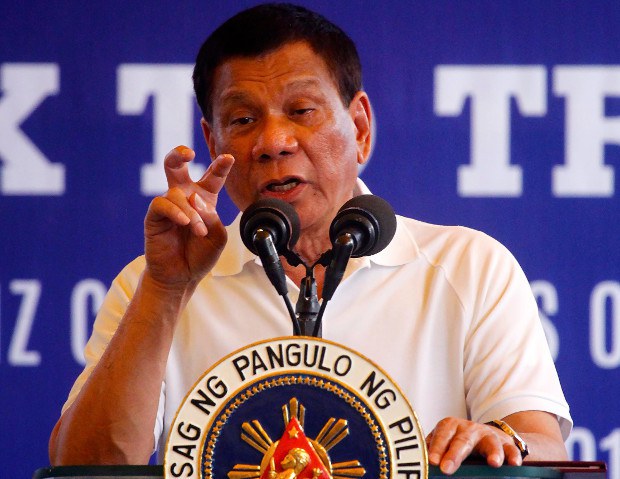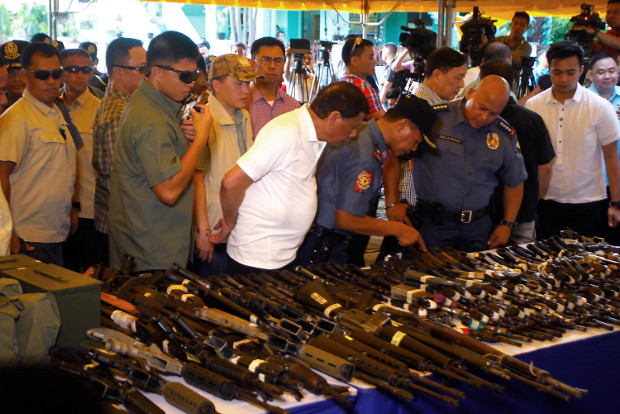Philippines Intensifies Drug War; 26 More Killed in Manila
2017.08.17
Ozamiz, Philippines
 Philippine President Rodrigo Duterte gestures during a speech in the southern city of Ozamiz to award police officers for what he described as a successful anti-drugs operation in July that left 15 dead, including city mayor Reynaldo Parojinog, Aug. 17, 2017.
Philippine President Rodrigo Duterte gestures during a speech in the southern city of Ozamiz to award police officers for what he described as a successful anti-drugs operation in July that left 15 dead, including city mayor Reynaldo Parojinog, Aug. 17, 2017.
Police shot dead 26 more suspected drug pushers and addicts around the Philippine capital Manila, officials said Thursday, raising this week’s death toll to 58 as President Rodrigo Duterte’s crackdown intensified.
The “one time, big time” police operations were carried out near simultaneously starting late Wednesday, with all 11 precincts in Manila participating, said Senior Supt. Erwin Margarejo, a police spokesman.
The new casualty figures were on top of the 32 people slain in similar operations Monday and Tuesday.
That makes this week the bloodiest since Duterte launched his drug war and vowed to kill thousands of drug pushers and addicts whom he has blamed for slowly turning the Southeast Asian country into a narco-politics state.
It also came just weeks after police killed 15 people, including a mayor on Duterte’s list of 150 officials allegedly involved in the drug trade, in a daring pre-dawn raid in the southern city of Ozamiz. The mayor, Reynaldo Parojinog, was the third politician in Duterte’s list who was slain.
Margarejo said the high number of casualties resulted from multiple shootouts. No police officer, however, suffered any injury, officials said.
He said similar operations would continue, as he warned Manila residents involved in drugs to cease their illegal and criminal activities or be caught or “neutralized,” the common police slang for the word killed.
More than 8,000 people have been killed in Duterte’s drug war, including those slain by vigilantes, according to a BenarNews tally.
Duterte on Wednesday night praised police for the crackdown, and vowed that his government’s tough stance against drugs, backed by the 170,000-strong police force, would continue.
He also blamed the proliferation of drugs for most of the country’s woes.
Duterte vows to pardon officers
Duterte last week told police officers to carry out their duties, promising to pardon them if they are investigated or convicted of killing suspects in the course of carrying out the drug war.
“If they want to put up a violent fight, thereby placing yourself, the lawmen, in jeopardy, go for it. That is my order,” he said.
On Thursday, Duterte travelled to the southern city of Ozamiz, along with national police chief Ronald dela Rosa, and hailed the officers for the raid that killed Parojinog, the city mayor.
The president pinned medals on the officers who led the raid, and inspected a cache of firearms they said was confiscated from Parojinog’s men.
Dela Rosa insisted that the operations that led to big casualties in Manila and in Bulacan province, which borders the capital, were above board.
“You should start wondering when everyone is dead,” Dela Rosa said, adding that there were suspects who were alive and arrested.
Police anti-drug raids would continue, he said.

Philippine President Rodrigo Duterte inspects firearms that police officials said were surrendered by supporters of Reynaldo Parojinog, the mayor of the southern city of Ozamiz who was killed with 14 others in July during a purported anti-drug raid, Aug. 17, 2017. [Mark Navales/BenarNews]
HRW: ‘Like painting a target’
Meanwhile, New York-based Human Rights Watch on Thursday blasted Duterte for putting the country’s rights community in danger by telling officers on Wednesday that they were free to shoot activists whom they perceive to be “obstructing justice.”
“Duterte should immediately withdraw his statement or be investigated for possibly instigating or inciting violence against Philippine human rights advocates,” said Phelim Kine, deputy Asia director at Human Rights Watch.
“President Duterte’s threats against human rights activists is like painting a target on the backs of courageous people working to protect the rights and upholding the dignity of all Filipinos,” he said.
The president in December also threatened to kill human rights activists, allegedly for abetting drug use in the Philippines. A month later, he warned that lawyers representing drug users and dealers were also fair game.
“Duterte is on notice that his death threats against human rights advocates could pave the way for prosecution for crimes against humanity,” Kine said, adding that there was a need for a United Nations-led probe into the president’s “drug-war slaughter.”
Felipe Villamor contributed to this report.







